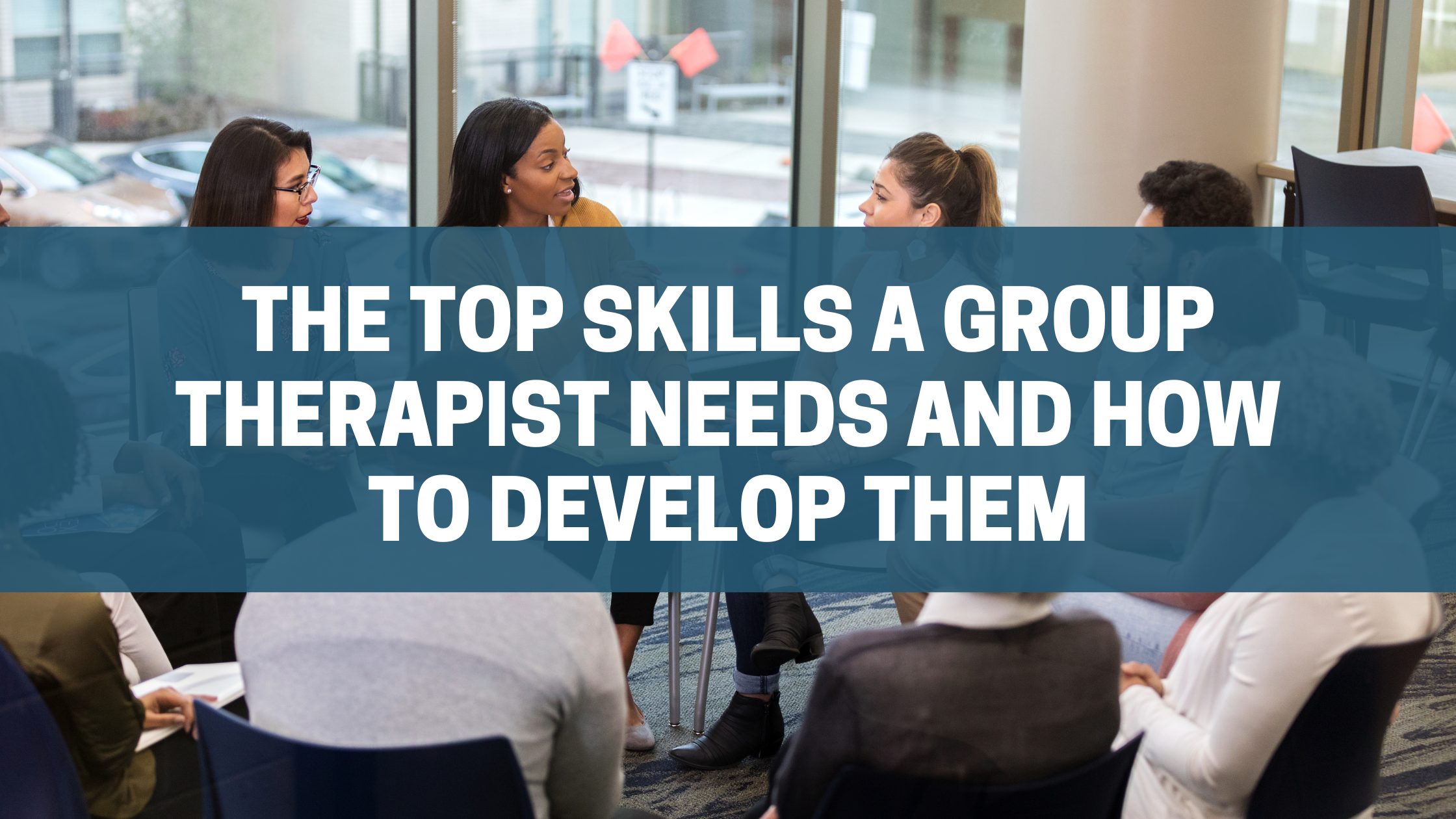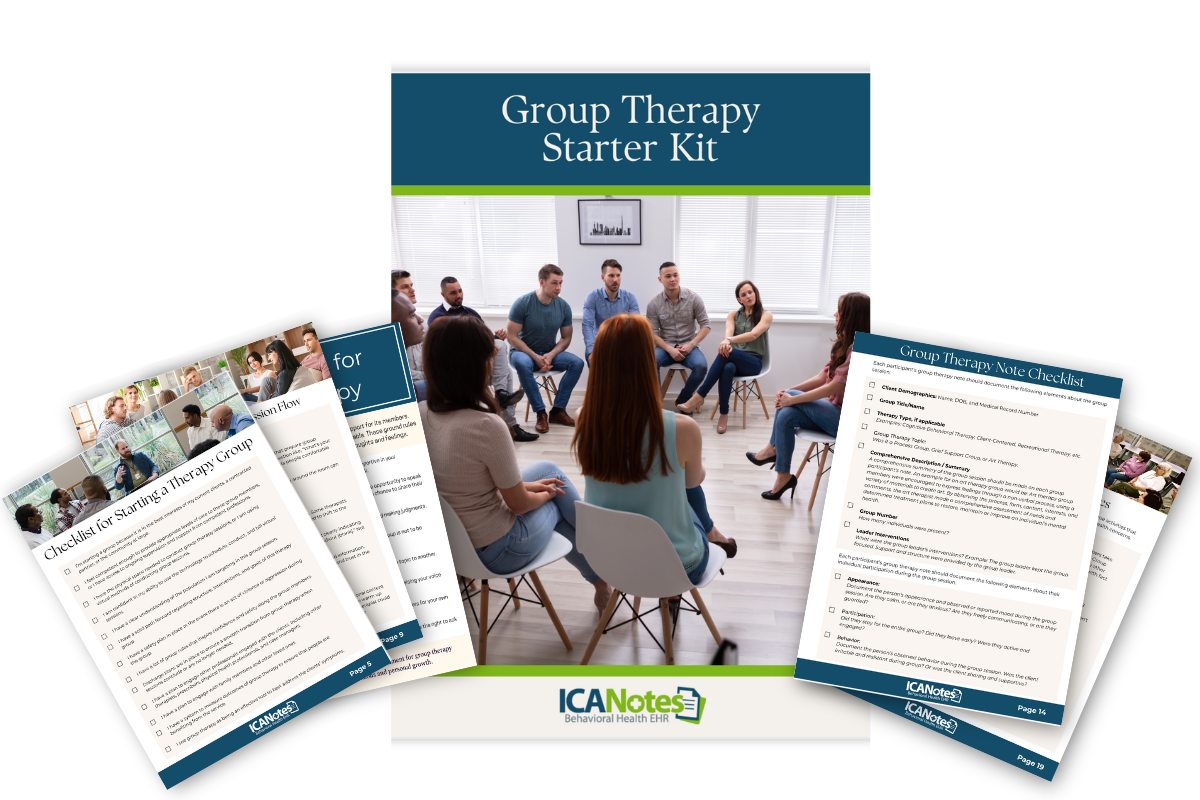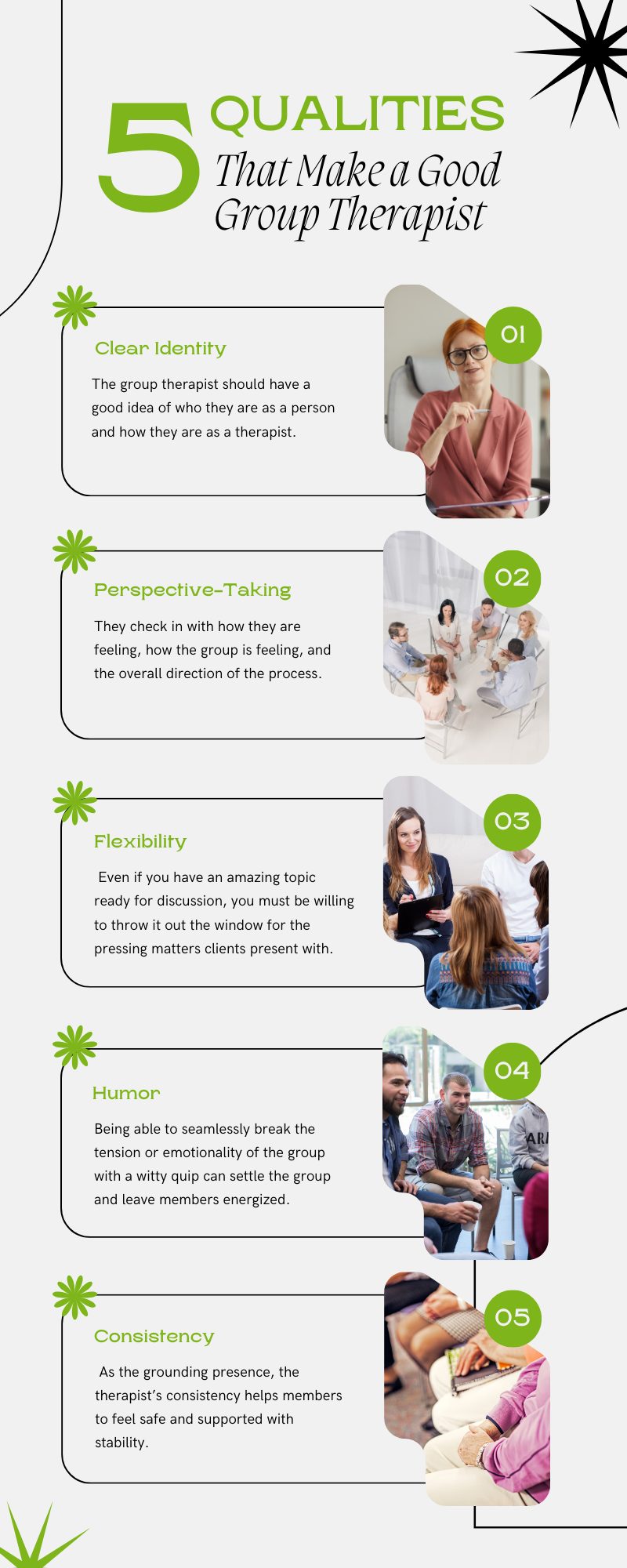
The Top Skills a Group Therapist Needs and How to Develop Them
A good group therapist knows that skill building is a never-ending process, and while some may seem innately gifted with an ability to be a great group therapist, everyone has to work to develop their skills. Surely many of the characteristics and qualities of a group facilitator will overlap with those of any therapist, but the differences deserve attention.
Free Download: Group Therapy Starter Kit
Download an exclusive copy of our Group Therapy Starter Kit packed with valuable articles on building and sustaining therapy groups, enhancing your skills, and working with special populations. You'll also gain access to 9 essential resources that every clinician needs to run successful therapy groups.

Skills Every Group Therapist Should Build
Under the right conditions, amazing progress can happen in group sessions. By using their skills, natural abilities, and personality characteristics, a group therapist can maximize the magic.
Skills a group therapist should bring to session include:(1)
- Observing and listening. Any therapist needs to have good listening and observing skills. The ability to absorb the messages your client gives you is essential to everything that follows. In group sessions, this skill is more important as your attention will be split between multiple clients. With a little practice, you’ll be able to listen to who’s speaking, note side conversations, and see when a client on the other side of the room looks more anxious. Having all of this information gives the group therapist a tremendous advantage in the session.
- Facilitating. The skill of navigating a session from an uncertain beginning to a satisfying end is facilitating. If a group meeting is feeling lost, directionless, or unproductive, a lack of facilitation could be to blame. Facilitating a group session is a lot like a football coach calling plays to lead their team down the field. You have to call the best plays at the best times. Even more importantly, you can be phased if your play call leads to a loss of yards. You move onto the next play and hope for a positive result.
- Protecting. Group members must feel safe, supported, and secure in session, so protecting is a needed skill for a group therapist. Protecting involves keeping each client guarded from any harm from other members, whether it’s verbal or physical, active or passive.
- Blocking. Blocking is another skill that protects the client. Here, the group therapist works to shield the group from unhelpful actions coming from members. The therapist creatively shuts down the problematic behaviors, which preserves the safety, comfort, and trust of group members, even if they were not directly involved in the issue.
- Confronting. Blocking and protecting skills are used to reduce the harm to innocent group members, but confronting is the act of directly and clearly shining a spotlight on the unwanted actions of a group member. This therapeutic decision is a delicate one as the member may feel singled out or attacked, but it can assert your authority as an expert and serve as a model for effective communication.
- Linking. Where protecting and blocking focuses on building distance between clients, linking aims to bring clients closer together. During linking, the group therapist points out similarities and connections between two or more group members. Through this process, members feel more united and bound to each other. Linking encourages members to band together and accomplish their goals.
- Delegating. As the group leader, the therapist can skillfully assign a level of power and responsibility to group members. This delegation can engage a passive client or build the self-esteem of a client full of doubt and worry. The who, how, and when of delegation is an artform, but a group therapist interested in skillfully developing this can experiment with people, times, and levels of delegation to study the results.
- Creating. Being creative could be the most important and valuable skill for a group therapist to possess. To see a situation unfold and quickly react with an appropriate set of responses is like a superpower. Even though it may seem like creativity is a gift that only some people have, anyone can boost their creativity with the investment of time and energy. Sometimes the best way to build creativity is by turning down your internal filter and going with the ideas, thoughts, or plans that first come to mind.
Not all of these skills will be used in all sessions, but having these in your toolkit will surely make you a better, more competent group therapist.
Qualities that Make a Good Group Therapist
If you are looking at the list of group therapy skills and feeling underqualified, don’t worry. A lot of what makes a good group therapist is a collection of attributes, characteristics, and qualities that you possess naturally, even if you don’t realize it.
A good group therapist has qualities like:(2)
- Clear identity. The group therapist should have a good idea of who they are as a person and how they are as a therapist. They should be confident in what they know and open about what they do not. Group members can do well to spot someone that seems inauthentic or disingenuous, so know who you are. If you don’t, your group members may offer their perspective, which might sting if you’re not prepared.
- Perspective-taking. A good group therapist has the ability to mentally pause the group and take a snapshot of the process. They check in with how they are feeling, how the group is feeling, and the overall direction of the process. If you innately have the ability to accurately empathize with a group of people, you could be a great group therapist.
- Flexibility. In group therapy sessions, it’s survival of the fittest. Being overly rigid about your topic or plans will leave you feeling frustrated and disappointed. Even if you have an amazing topic ready for discussion, you must be willing to throw it out the window for the pressing matters clients present with.
- Humor. Are you a fun person? Do you have a good sense of humor that can balance out the intensity of therapy content? If yes, you have the making of a good group therapist. People struggle when content is all sad or all stress for long, which is why plays, movies, and TV shows have moments of levity. Being able to seamlessly break the tension or emotionality of the group with a witty quip can settle the group and leave members energized, rather than drained.
- Consistency. A group therapist needs to walk into the room with energy that is similar each week. As the grounding presence, the therapist’s consistency helps members to feel safe and supported with stability. Alternatively, a therapist that presents to session wildly different each week will leave the members unsettled and confused. They may be less inclined to process important issues if they cannot trust the group therapist as their safety net.

Final Thoughts on Group Therapist Skills
Some people have the natural inclination to be a wonderful group therapist, while other people have to work hard to build the needed skills. As long as you are patient with yourself and the process through a willingness to make mistakes, you can achieve your goal of being a group therapist. And plenty of clients in need will be happy you stuck with it.
Being an effective group therapist involves continuously honing a diverse set of skills such as observing, facilitating, protecting, and linking. These skills are critical in creating a therapeutic environment where clients feel safe, understood, and connected. Mastering these skills enhances the dynamics of group therapy, allowing therapists to guide their clients towards meaningful progress and healing.
ICANotes provides a powerful platform to document and track your sessions efficiently. By using ICANotes, you can maintain comprehensive and organized records of your group's interactions, which helps you identify patterns and areas for improvement. The group therapy notes module in ICANotes significantly reduces the time spent on documentation, allowing you to focus more on developing and applying your therapeutic skills.
Investing in your growth as a group therapist, supported by robust documentation tools like ICANotes, will lead to better outcomes for your clients and a more rewarding practice for you.
Book a demo and find out how to streamline your group therapy documentation process.
About the Author

Eric Patterson, MSCP, NCC, LPC
Eric Patterson, MSCP, NCC, LPC, is a professional counselor who has been working for over a decade to help children, adolescents, and adults in western Pennsylvania reach their goals and improve their well-being.
Along the way, Eric worked as a collaborating investigator for the field trials of the DSM-5 and completed an agreement to provide mental health treatment to underserved communities with the National Health Service Corp.
Sources
- Australian Institute of Professional Counselors. (2011). Skills and Role of the Group Therapist.
- Substance Abuse and Mental Health Services Administration. (2005). Substance Abuse Treatment: Group Therapy. StatPearls.
